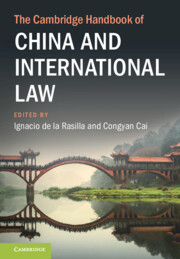Book contents
- The Cambridge Handbook of China and International Law
- The Cambridge Handbook of China and International Law
- Copyright page
- Contents
- Figures
- Contributors
- Foreword
- Acknowledgements
- Abbreviations
- Introduction
- Part I Taking Centre Stage in Global Governance and the International Legal Order
- Part II Interfaces between National and International Law
- Part III Selected Areas of Chinese State Practice
- Part IV International Peace and Security
- 10 The Chinese Approach to Jus ad Bellum in International Law and Cyberwarfare
- 11 China and International Terrorism Law
- 12 China and International Criminal Law
- Part V Human-Centred International Law
- Part VI The Habitat and the Global Commons
- Part VII International Economic Law
- Part VIII International Dispute Settlement
- Index
12 - China and International Criminal Law
A Dual-Identity Dilemma
from Part IV - International Peace and Security
Published online by Cambridge University Press: 04 January 2024
- The Cambridge Handbook of China and International Law
- The Cambridge Handbook of China and International Law
- Copyright page
- Contents
- Figures
- Contributors
- Foreword
- Acknowledgements
- Abbreviations
- Introduction
- Part I Taking Centre Stage in Global Governance and the International Legal Order
- Part II Interfaces between National and International Law
- Part III Selected Areas of Chinese State Practice
- Part IV International Peace and Security
- 10 The Chinese Approach to Jus ad Bellum in International Law and Cyberwarfare
- 11 China and International Terrorism Law
- 12 China and International Criminal Law
- Part V Human-Centred International Law
- Part VI The Habitat and the Global Commons
- Part VII International Economic Law
- Part VIII International Dispute Settlement
- Index
Summary
China’s engagement with international criminal law almost dates back to the creation of the body of law when the Tokyo tribunal was first established; China has followed closely the continuous evolution of international criminal law in various contemporary institutional contexts. Since China has involved itself in the making and development of international criminal law, it no longer views the body of law as subject to the same criticism as some of its aspects dating back to the nineteenth century, but it is not willing to take a step beyond its stance of positive engagement and commit fully to the binding force of international criminal law. This chapter aims to understand the evolving relationship of China with international criminal law, from the substantive issues that have influenced the nature of that relationship to date to the factors relating to China’s interactions with this body of law in the years to come. The chapter seeks to explore how China’s dual identities as both a developing country and a rising great power, which represent different kinds of state interests and preferences, give rise to competing concerns in its relationship with international criminal law.
Keywords
- Type
- Chapter
- Information
- The Cambridge Handbook of China and International Law , pp. 238 - 258Publisher: Cambridge University PressPrint publication year: 2024

